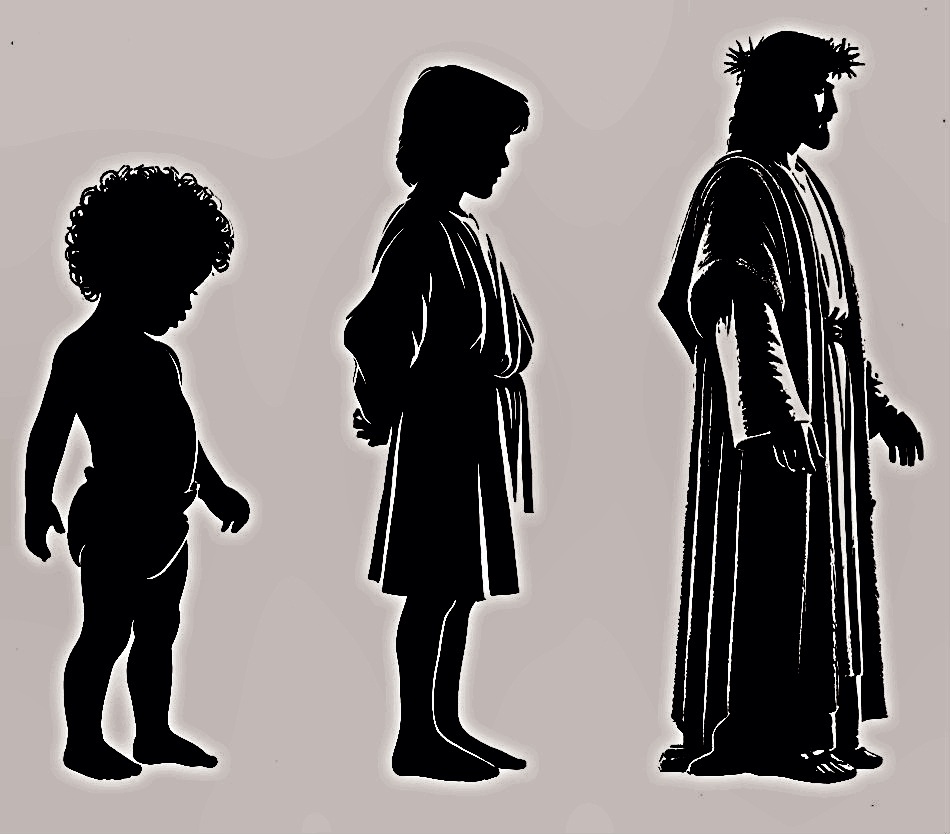How Did Jesus Grow in Favour With God? Reformed Views on Luke 2:52
“And Jesus increased in wisdom and stature, and in favour with God and man” (Luke 2:52). This simple statement presents us with what appears to be a profound theological puzzle: How could Jesus, the eternal, beloved Son of God, grow in favour with His Father? The question touches on deep mysteries of Christ’s incarnation and the relationship between His divine and human natures.
Luke’s Gospel provides us with this remarkable glimpse into Christ’s development during His early years. The very notion Jesus can “increase” in divine favour seems to challenge our understanding of His eternal deity. Yet this verse reveals crucial truths about Christ’s genuine humanity and His work as our Mediator.
BIBLICAL FOUNDATION
The Two Natures of Christ: To understand how Jesus could grow in favour with God, we must first ground ourselves in the biblical teaching about Christ’s two natures. The Chalcedonian Definition (451 AD), echoed in the Westminster Confession of Faith, affirms that Jesus is both fully God and fully man, with two distinct natures in one person “without confusion, without change, without division, without separation.” To Learn More, Do Check Out Our Post, Why do We Affirm Jesus is Fully God and Fully Man?
This foundational truth helps us approach Luke 2:52 with proper theological categories. Christ’s growth in favour occurred according to His human nature, while His divine nature remained unchangeably perfect in the Father’s favour.
Biblical Parallels: Scripture provides several complementary perspectives on Christ’s human development:
Earlier in Luke’s Gospel, we read “the Child grew and became strong” (Luke 2:40). The author of Hebrews tells us Jesus “learned obedience through what he suffered” (Hebrews 5:8-9). Paul speaks of Christ’s voluntary humbling of Himself, taking “the form of a servant” (Philippians 2:7-8). Isaiah prophesied of the Spirit’s role in Christ’s human life, declaring “the Spirit of the LORD shall rest upon him” (Isaiah 11:1-2).
REFORMED FATHERS’ PERSPECTIVES
John Calvin’s View: John Calvin, in his commentary on Luke 2:52, provides crucial insight into this mystery. He writes Christ “voluntarily emptied himself by taking the form of a servant,” emphasising Jesus’s growth was real, not merely apparent. Calvin maintains that while Christ never lacked wisdom, He chose to grow gradually in His human nature for our sake.
In his Institutes, Calvin further explains Christ’s human development was necessary for our salvation. He demonstrated true human experience while maintaining His divine perfection, showing how the two natures work together in perfect harmony.
Other Reformed Voices: Herman Bavinck, in his Reformed Dogmatics, emphasises Christ’s growth in favour with God reflects the perfect unfolding of His human nature. He explains Jesus didn’t progress from imperfection to perfection, but rather from one degree of perfection to another.
Charles Hodge provides a helpful distinction between Christ’s inherent perfection and its progressive manifestation in human experience. This growth, he argues, was the natural and proper development of Christ’s perfect human nature.
Abraham Kuyper, in his work on the Holy Spirit, offers unique insights into Christ’s development. In The Work of the Holy Spirit, Kuyper emphasises how the Holy Spirit was instrumental in Christ’s human development. Kuyper argues Jesus’ growth in favour occurred through the Spirit’s work in His human nature.
Michael Horton, in his systematic theology The Christian Faith, emphasises how Christ’s growth in favour demonstrates the genuine nature of His incarnation without compromising His deity. He explains how this growth relates to Christ’s role as the last Adam, perfectly fulfilling human development in a way the first Adam failed to do.
THEOLOGICAL ANALYSIS
- The Reality of Christ’s Human Development: Christ’s growth in favour with God represents genuine human development. This wasn’t merely apparent growth but real advancement in His human experience and expression of virtue. Yet importantly, this development never involved overcoming sin or imperfection, as Christ was always without sin (Hebrews 4:15).
- The Nature of Divine Favour: The “favour” described in Luke 2:52 relates to the Father’s pleasure in the perfect human obedience of His Son. As Jesus fulfilled each stage of human development perfectly, the Father’s delight was expressed appropriately to each stage. This wasn’t a growth from divine disapproval to approval, but rather the Father’s pleasure in His Son’s perfect fulfillment of every phase of human life.
- Implications for Reformed Christology: This understanding preserves both Christ’s true humanity and His perfect deity. It shows how the incarnate Son lived a genuinely human life while remaining the eternal Son of God. This truth is crucial for our salvation, as Christ had to be both fully God and fully man to serve as our perfect Mediator.
PRACTICAL APPLICATIONS
Understanding Christ’s Sympathy
The reality of Christ’s human development means He truly understands our experience of growth and maturation. Hebrews 4:15 assures us we have a High Priest who can sympathise with our weaknesses, having experienced genuine human development while remaining without sin.
Model for Christian Growth
Christ’s pattern of growth provides a model for Christian development. While we grow from imperfection toward perfection (unlike Christ), His life shows us what human development looks like when perfectly aligned with God’s will. This encourages us in our own spiritual growth while maintaining proper humility about our need for sanctification.
CONCLUSION
Luke 2:52 reveals profound truths about Christ’s incarnation and work as our Mediator. His growth in favour with God demonstrates both His true humanity and His perfect fulfillment of every stage of human life. This truth provides deep comfort for believers, showing us a Saviour who truly understands human experience while remaining the perfect Son of God.
Reformed theology helps us navigate this mystery by maintaining both Christ’s true humanity and His unchangeable deity. As we contemplate this truth, we’re led to worship the One who humbled Himself for our salvation, growing in wisdom and favour while remaining eternally perfect in His Father’s sight.
How Did Jesus Grow in Favour With God?—Related FAQs
How can a perfect divine being experience any kind of growth? This question touches on the heart of Chalcedonian Christology. While Christ’s divine nature remained unchangeably perfect, His human nature experienced genuine development. The Westminster Confession helpfully distinguishes between Christ’s two natures while maintaining the unity of His person. Growth occurred not in His divine nature (which is impossible) but in His human nature’s expression and manifestation of perfect obedience at each stage of development.
Key Scripture: “For we do not have a high priest who is unable to sympathize with our weaknesses, but one who in every respect has been tempted as we are, yet without sin” (Hebrews 4:15).
- Doesn’t growth imply previous imperfection or deficiency? Not necessarily. Reformed theologians distinguish between development within perfection and development from imperfection to perfection. Christ’s growth was like a perfect flower blooming—each stage is perfect for what it should be at that moment, yet it still develops. John Calvin notes Christ’s human nature developed according to its proper order without ever lacking what was appropriate for each stage. Consider how even Adam before the Fall could grow and develop while being without sin. Growth and development belong to unfallen human nature, not just to fallen human nature.
- How does this relate to Christ’s immutability as taught in Hebrews 13:8? “Jesus Christ is the same yesterday and today and forever” (Hebrews 13:8) refers to Christ’s divine nature and His unchanging character and promises. Reformed theology maintains immutability is compatible with genuine human experience through the doctrine of the hypostatic union. Herman Bavinck explains Christ’s immutable divine nature maintained perfect fellowship with the Father while His human nature experienced genuine growth and development.
What about modern liberal theological interpretations that deny Christ’s deity in favour of pure human development? Liberal interpretations often commit the error of dividing the person of Christ, focusing exclusively on His humanity while denying or minimising His deity. The Reformed tradition, following Scripture and the early church councils, insists on maintaining both Christ’s full deity and full humanity. Luke 2:52 shows us Christ’s true humanity without compromising His deity. Modern attempts to reduce Christ to merely human development fail to account for the full biblical witness to His divine nature (John 1:1-14; Colossians 1:15-20; Hebrews 1:1-4).
How does this understanding differ from other Christian traditions? While all orthodox Christian traditions affirm Christ’s two natures, Reformed theology particularly emphasises:
- The necessity of Christ’s genuine human development for our salvation
- The role of the Holy Spirit in Christ’s human development
- The covenantal framework within which Christ’s growth occurs
- The preservation of divine immutability while affirming real human growth
This differs from some Lutheran emphases on the communication of attributes between natures, and from Eastern Orthodox views that sometimes blur the distinction between divine and human attributes.
- If Jesus had perfect divine knowledge, why did He need to grow in wisdom? Reformed theologians explain this through the doctrine of Christ’s voluntary self-limitation (kenosis) properly understood. While retaining His divine omniscience, Christ chose to experience genuine human learning and development. As Calvin notes, Christ accommodated Himself to the ordinary way of human development for our sake. His divine knowledge did not eliminate the reality of His human experience of learning and growth.
- Was Christ’s growth in favour with God merely an external posturing for our benefit? No, the Reformed tradition firmly rejects any form of docetism (the heresy that Christ only appeared to be human). Christ’s growth in favour was genuine human development, not mere appearance. However, this growth was unique in that it was the perfect expression of human development, never involving sin or deficiency. Each stage of His development perfectly pleased the Father, yet this pleasure was expressed appropriately to each stage of genuine human growth.
How Did Jesus Grow in Favour With God?—Our Related Posts
Editor's Pick

Paul’s Mandate for Men: Headship Or Servant Leadership? Or Both?
Modern Christianity has fallen into a trap. We've created an either/or battle between "headship" and "servant leadership," as if these [...]

Should We Stop Using Male Pronouns for God? Why Do We Say No?
A friend of ours arrived eagerly at his first theology class in seminary. But he quickly discovered something troubling: the [...]

Did Old Testament Law Force Women to Marry their Rapists?
**Editor’s Note: This post is part of our series, ‘Satan’s Lies: Common Deceptions in the Church Today’… Viral misinformation abounds [...]

From Danvers To Nashville: Two Statements, One Biblical Vision
30 years separate the Danvers Statement on Biblical Manhood and Womanhood (1987) and the Nashville Statement on Human Sexuality (2017). [...]

The Nashville Statement: Why Affirm It Despite Media Backlash?
WHY DO REFORMED CHRISTIANS STAND BY THIS STATEMENT ON MARRIAGE AND GENDER? When the Nashville Statement was released in 2017, [...]

Who Is Belial? Solving The 2 Corinthians 6:15 Mystery
Belial: This name from the pages of Scripture chills the soul. Who is this mysterious figure Paul invokes in 2 [...]

Celibacy Or Castration: What Jesus Really Means in Matthew 19:12
One of Scripture's most shocking misinterpretations led theologian Origen to castrate himself in the third century. His tragic mistake? Taking [...]

Philippians 4:13: Did Paul Really Mean We Can Do ALL Things?
"I can do all things through Christ who strengthens me." It's on gym walls, graduation cards, and motivational posters everywhere. [...]

The Ordinary Means of Grace: Why Are They Indispensable?
ORDINARY MEANS FOR EXTRAORDINARY TRANSFORMATION What if God's most powerful work in believers' lives happens through the most ordinary activities? [...]

Is the Bible God’s Word? Or Does It Only Contain God’s Word?
The authority of Scripture stands at the crossroads of modern Christianity. While some argue the Bible merely contains God’s Word [...]
SUPPORT US:
Feel the Holy Spirit's gentle nudge to partner with us?
Donate Online:
Account Name: TRUTHS TO DIE FOR FOUNDATION
Account Number: 10243565459
Bank IFSC: IDFB0043391
Bank Name: IDFC FIRST BANK






